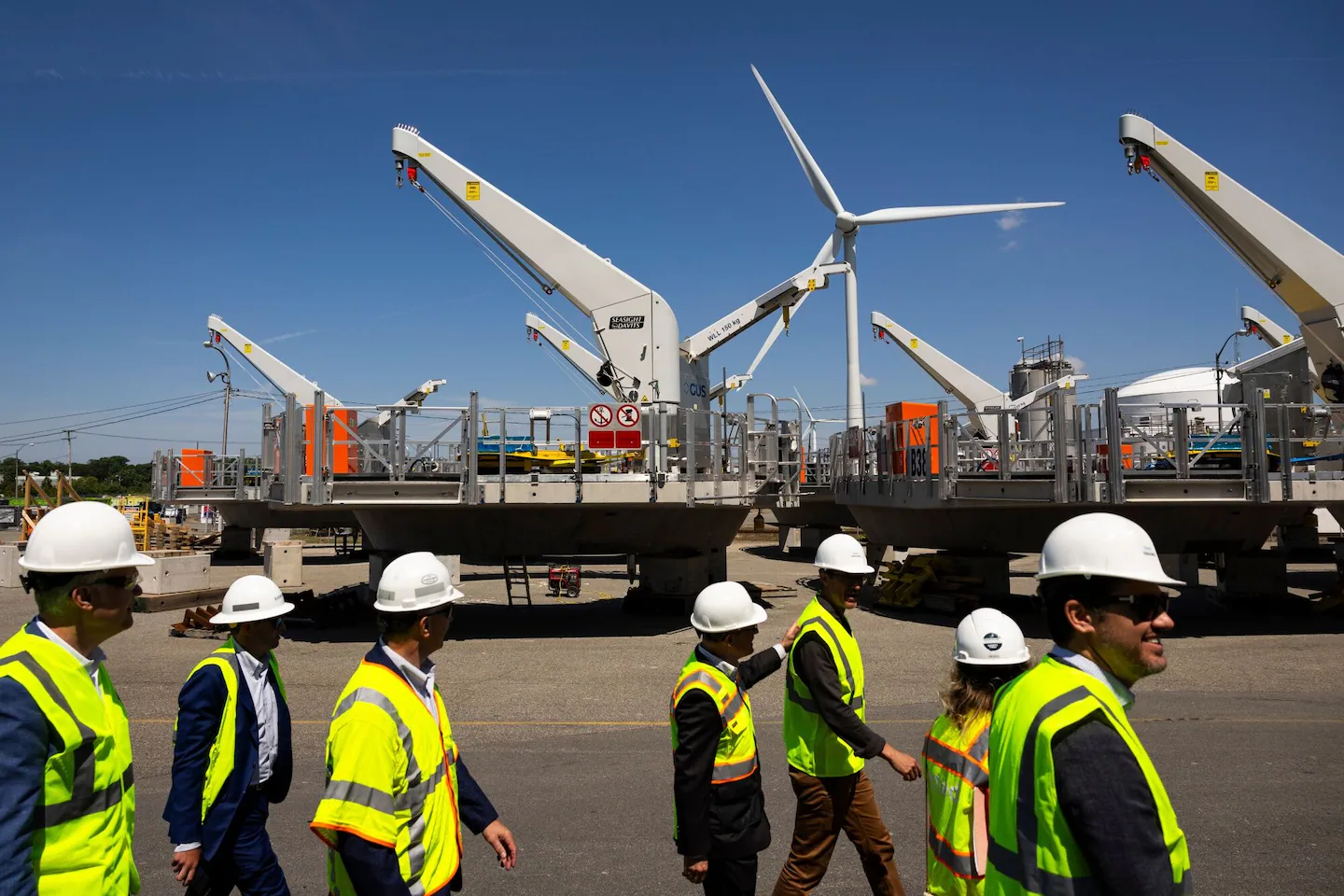
The documents, however, also show wind farm developer Ørsted said the company had been meeting regularly with federal officials, up until two days before the US Department of Interior’s order. The possibility of such an order was never raised, filings show.
The filings, a part of a federal lawsuit brought by the Revolution Wind joint venture between the Danish firm and a consortium led by Skyborn Renewables, provide the first public details on the backstory behind the order issued against the $5 billion, 65-turbine project.
Already about 80 percent complete, Revolution Wind is poised to deliver enough electricity to power 350,000 homes in Rhode Island and Connecticut, and was on track to begin providing a boost to New England’s electric grid by next spring.
The sudden stoppage was met with an outpouring of frustration from Rhode Island officials in August. The Bureau of Ocean Energy Management said at the time only that the agency was looking to address “concerns related to the protection of national security interests.”
In an affidavit filed Sept. 12, Adam Suess, acting assistant secretary for Land and Minerals Management overseeing the bureaus of Ocean Energy Management and Safety and Environmental Enforcement, wrote the stop order was issued so the Department of the Interior could assess how the project’s “continued inability to reach” mitigation agreements with the Department of Defense and the National Oceanic and Atmospheric Administration “may be impacting or will impact the environment, national security, and other reasonable uses of the waters.”
In 2024, after Revolution Wind approached the Bureau of Ocean Energy Management about delays over construction and other issues, the bureau approved variances to an earlier “construction and operations plan,” according to Suess.
For example, the bureau allowed Revolution Wind until July 2025 to comply with a requirement that it either agree with NOAA on a plan to “mitigate the impacts of its project on NOAA’s scientific surveys or submit its own plan to do so,” Suess wrote. The bureau also required Revolution Wind to reach “further mitigation agreements” with defense officials but it did not require the concerns to be addressed before construction began, according to Suess.
The Department of Defense said it would seek mitigation that would “de-conflict the …. project with national defense interests,” including risk from “distributed optical fiber sensing and acoustic monitoring equipment deployed as part of the project” and “evaluation and mitigation of risk related to foreign investment,” according to Suess.
Suess wrote the concerns were unaddressed in an annual report submitted by Revolution Wind in January, the affidavit states.
“As of the date of this declaration, the Department of the Interior has not received any information that these requirements have been satisfied and, given how long they have remained pending, the department has concerns as to whether they will ever be met,” Suess wrote. “Further, Revolution Wind still has not mitigated NOAA’s concerns as to the impacts to NOAA’s National Marine Fisheries Service surveys.”
Suess wrote the bureau has been in touch with NOAA and defense officials to gather more information since it issued the stop work order.
Meaghan Wims, a spokesperson for Ørsted, declined to comment on Wednesday.
However, in an affidavit filed Sept. 5, Melanie Gearon, the head of northeast permitting for Ørsted North America, wrote Revolution Wind worked with multiple federal agencies to ensure compliance with its construction and operations plan.
Ørsted met approximately bi-weekly throughout 2025 with the bureaus of Ocean Energy Management and Safety and Environmental Enforcement “to discuss construction updates, plans, reports, mitigation agreements, and other matters relating to the project,” Gearon wrote.
The most recent meetings were held on Aug. 6 and 20 — two days before the stop work order was issued, according to Gearon.
“At neither of these meetings — nor at any other recent project meetings or in correspondence — did BOEM raise the possibility of a stop work order or the need for any disruption of or conditions on the project’s ongoing construction relating to any concerns regarding national security or interference with reasonable uses of the exclusive economic zone, the high seas, and the territorial seas, or for any other reason,” Gearon wrote.
Notably, NOAA frequently attended meetings Ørsted held throughout the year with the US Coast Guard, according to Gearon.
In an affidavit, Paul Murphy, senior engineering, procurement, and construction director at Ørsted North America, wrote Revolution Wind “conservatively estimates” it is losing more than $2 million per day on installation and manufacturing contracts since the construction shutdown.
Murphy added that “even a relatively brief delay” could also push the “operational date of the project into 2027,” past the original date in November 2026.
Earlier this month, officials in Rhode Island and Connecticut filed a separate lawsuit against the federal government over the decision to halt construction, arguing, among other points, the stoppage hurts each state’s economy and that halting the project will undermine the reliability of the region’s power grid.
On Wednesday, Rhode Island Attorney General Peter F. Neronha and Connecticut Attorney General William Tong filed a motion for preliminary injunction to overturn the stop work order.
“In the few weeks since the stop work order was issued, without warning or reason, Rhode Islanders have been harmed, facing daily uncertainty,” Neronha said in a statement. “We have heard difficult stories from union workers who are out of a job, and from businesses who are now reluctant to pursue economic ventures due to the uncertainty created by this Administration’s decision. Further, Rhode Islanders continue to bear the brunt of the rising and increasingly unstable energy costs and environmental harms associated with fossil fuels.”
Federal officials have not yet responded to that complaint in court, records show.



